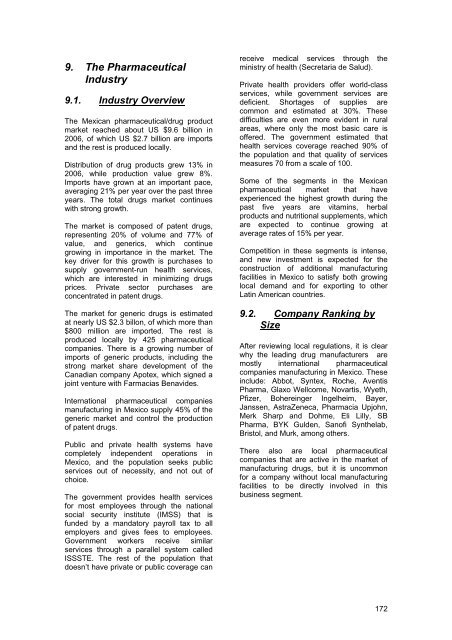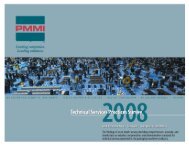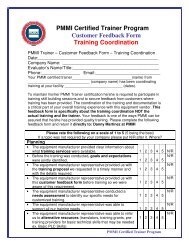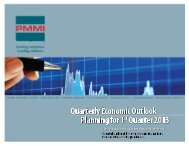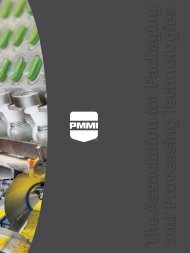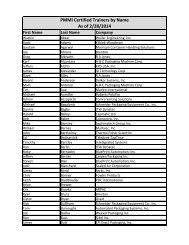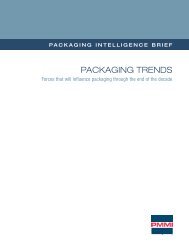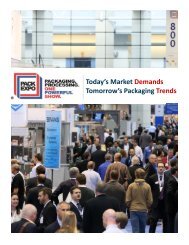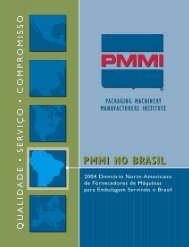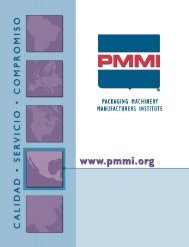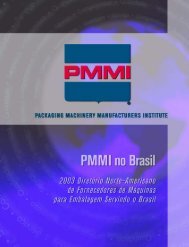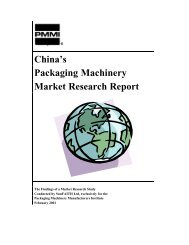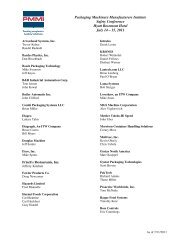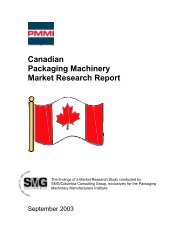9. The Pharmaceutical Industry - PMMI
9. The Pharmaceutical Industry - PMMI
9. The Pharmaceutical Industry - PMMI
You also want an ePaper? Increase the reach of your titles
YUMPU automatically turns print PDFs into web optimized ePapers that Google loves.
<strong>9.</strong> <strong>The</strong> <strong>Pharmaceutical</strong><br />
<strong>Industry</strong><br />
<strong>9.</strong>1. <strong>Industry</strong> Overview<br />
<strong>The</strong> Mexican pharmaceutical/drug product<br />
market reached about US $<strong>9.</strong>6 billion in<br />
2006, of which US $2.7 billion are imports<br />
and the rest is produced locally.<br />
Distribution of drug products grew 13% in<br />
2006, while production value grew 8%.<br />
Imports have grown at an important pace,<br />
averaging 21% per year over the past three<br />
years. <strong>The</strong> total drugs market continues<br />
with strong growth.<br />
<strong>The</strong> market is composed of patent drugs,<br />
representing 20% of volume and 77% of<br />
value, and generics, which continue<br />
growing in importance in the market. <strong>The</strong><br />
key driver for this growth is purchases to<br />
supply government-run health services,<br />
which are interested in minimizing drugs<br />
prices. Private sector purchases are<br />
concentrated in patent drugs.<br />
<strong>The</strong> market for generic drugs is estimated<br />
at nearly US $2.3 billon, of which more than<br />
$800 million are imported. <strong>The</strong> rest is<br />
produced locally by 425 pharmaceutical<br />
companies. <strong>The</strong>re is a growing number of<br />
imports of generic products, including the<br />
strong market share development of the<br />
Canadian company Apotex, which signed a<br />
joint venture with Farmacias Benavides.<br />
International pharmaceutical companies<br />
manufacturing in Mexico supply 45% of the<br />
generic market and control the production<br />
of patent drugs.<br />
Public and private health systems have<br />
completely independent operations in<br />
Mexico, and the population seeks public<br />
services out of necessity, and not out of<br />
choice.<br />
<strong>The</strong> government provides health services<br />
for most employees through the national<br />
social security institute (IMSS) that is<br />
funded by a mandatory payroll tax to all<br />
employers and gives fees to employees.<br />
Government workers receive similar<br />
services through a parallel system called<br />
ISSSTE. <strong>The</strong> rest of the population that<br />
doesn’t have private or public coverage can<br />
receive medical services through the<br />
ministry of health (Secretaria de Salud).<br />
Private health providers offer world-class<br />
services, while government services are<br />
deficient. Shortages of supplies are<br />
common and estimated at 30%. <strong>The</strong>se<br />
difficulties are even more evident in rural<br />
areas, where only the most basic care is<br />
offered. <strong>The</strong> government estimated that<br />
health services coverage reached 90% of<br />
the population and that quality of services<br />
measures 70 from a scale of 100.<br />
Some of the segments in the Mexican<br />
pharmaceutical market that have<br />
experienced the highest growth during the<br />
past five years are vitamins, herbal<br />
products and nutritional supplements, which<br />
are expected to continue growing at<br />
average rates of 15% per year.<br />
Competition in these segments is intense,<br />
and new investment is expected for the<br />
construction of additional manufacturing<br />
facilities in Mexico to satisfy both growing<br />
local demand and for exporting to other<br />
Latin American countries.<br />
<strong>9.</strong>2. Company Ranking by<br />
Size<br />
After reviewing local regulations, it is clear<br />
why the leading drug manufacturers are<br />
mostly international pharmaceutical<br />
companies manufacturing in Mexico. <strong>The</strong>se<br />
include: Abbot, Syntex, Roche, Aventis<br />
Pharma, Glaxo Wellcome, Novartis, Wyeth,<br />
Pfizer, Bohereinger Ingelheim, Bayer,<br />
Janssen, AstraZeneca, Pharmacia Upjohn,<br />
Merk Sharp and Dohme, Eli Lilly, SB<br />
Pharma, BYK Gulden, Sanofi Synthelab,<br />
Bristol, and Murk, among others.<br />
<strong>The</strong>re also are local pharmaceutical<br />
companies that are active in the market of<br />
manufacturing drugs, but it is uncommon<br />
for a company without local manufacturing<br />
facilities to be directly involved in this<br />
business segment.<br />
172
<strong>9.</strong>3. Key Players<br />
Mexico’s largest pharmaceutical companies include:<br />
Top <strong>Pharmaceutical</strong> Companies Active in Mexico (Sales in Million US$)<br />
Company Origin 2006 Sales 2005 Sales Growth<br />
Bayer de México / DF GER 863.12 748.68 15%<br />
Pfizer / DF USA 761.65 731.65 4%<br />
Novartis / DF SUI 731.20 632.50 16%<br />
Roche / DF SUI 641.68 688.16 -7%<br />
Boehringer Ingelheim Promeco / DF GER 636.44 544.25 17%<br />
GlaxoSmithKline / DF GB 558.48 510.36 9%<br />
Bristol Myers Squibb / DF USA 548.17 523.56 5%<br />
Schering Plough / DF GAR/USA 424.07 547.98 -23%<br />
Wyeth / Méx. USA 377.77 323.25 17%<br />
Eli Lilly y Cía. de México / DF USA 340.81 291.87 17%<br />
AstraZeneca / Méx. GB/SUE 296.77 241.81 23%<br />
Merck Sharp & Dome de México / DF USA 292.75 267.87 9%<br />
Merck / Méx. GER 220.86 174.26 27%<br />
Ciba Especialidades Químicas México /<br />
DF SUI 160.57 144.23 11%<br />
Proquifin / DF MX 62.04 50.83 22%<br />
Laboratorios Sophia / Jal. MX 58.68 51.70 13%<br />
6,975.06 6,472.96<br />
Source: Expansión Magazine, Top 500 Mexican companies.<br />
Top Drug and OTC Distribution Companies (sales in million US$)<br />
Company Origin 2006 Sales 2005 Sales Growth<br />
Nacional de Drogas / DF MX 2,222.22 2,037.04 9%<br />
Grupo Casa Saba / DF MX 2,185.34 2,025.35 8%<br />
Fragua Corporativo / Jal. MX 1,074.15 910.39 18%<br />
Farmacias del Ahorro / DF MX 793.52 663.06 20%<br />
Farmacias Similares / DF MX 68<strong>9.</strong>63 605.56 14%<br />
Farmacias Benavides / NL CHILE 684.96 576.26 19%<br />
Maypo / DF MX 210.35 12<strong>9.</strong>19 63%<br />
7,860.18 6,946.83<br />
Source: Expansión Magazine, Top 500 Mexican companies.<br />
173
8.4 Company Profiles<br />
A) Company Description<br />
Astra Zeneca, S.A. de C.V.<br />
<strong>Industry</strong>: <strong>Pharmaceutical</strong><br />
Sub <strong>Industry</strong>: <strong>Pharmaceutical</strong> and medical<br />
products<br />
Location: Naucalpan, State of Mexico<br />
Size (sales): US $290 million<br />
Purchasing Potential: US $220,000<br />
Specific Business<br />
Opportunities:<br />
Strapping machines<br />
Astra Zeneca is one of the leading global pharmaceutical companies manufacturing prescription<br />
and over-the-counter (OTC) products.<br />
<strong>The</strong> company has one manufacturing plant located in the area of Naucalpan, in the state of<br />
Mexico, within greater Mexico City. It is considered to be state-of-the-art for the pharmaceutical<br />
industry. <strong>The</strong> production from this plant is sold into the Mexican market and for export into<br />
Central America. <strong>The</strong> company’s operations in Mexico employ 1,100 people, from<br />
manufacturing to its dedicated sales force.<br />
B) Main Products Produced and How <strong>The</strong>y Are Packed<br />
<strong>The</strong> company’s two main products are:<br />
Product Brand Package<br />
Nexium Astra Zeneca In blister, individual boxes and collective boxes<br />
Crestor Astra Zeneca In blister, individual boxes and collective boxes<br />
Most of the company’s products are tablets, which are packed similarly as those indicated in the<br />
previous table. <strong>The</strong> company also produces spray products that are packed in individual boxes<br />
and in boxes for transporting the individual presentations to the points of sale.<br />
C) Installed Packaging Machinery<br />
Astra Zeneca uses a large number of packing machines acquired from various suppliers. <strong>The</strong><br />
following table shows some of the most relevant machines for its packing operations in Mexico.<br />
Machinery Type Brand Units Origin Average<br />
Age<br />
Individual cartoning machine Markesini 3 Italy 10<br />
Individual cartoning machine Ulhman 1 Germany 8<br />
Individual cartoning machine Klockner 1 Germany 4<br />
Strapping machine Multipack 6 Italy 8<br />
Strapping machine Pester 1 Germany 4<br />
Collective cartoning machine 3M 8 Italy 8<br />
Plastic wrapping machine Markesini 1 Italy 11<br />
Plastic wrapping machine Ulhman 1 Germany 11<br />
Plastic wrapping machine Klockner 1 Germany 4<br />
174
D) Last Packaging Machinery Purchase<br />
Over the last three years, the company has invested approximately US $2.75 million in the<br />
purchase of packing machinery. <strong>The</strong>se purchases resulted from the need to replace machinery,<br />
and to improve the efficiency of the packing operation.<br />
<strong>The</strong> most recent packing machinery purchase took place in 2007, when it acquired the<br />
following:<br />
Machinery Brand Country<br />
Cartoning machine Markesini Italy<br />
<strong>The</strong> purchase was made though the manufacturer’s distributor in Mexico.<br />
E) Future Packaging Machinery Ordering Plans<br />
Astra Zeneca develops its budget for the purchase of machinery based on the expected<br />
demand growth for it products or new plans for the introduction of additional lines to the market.<br />
<strong>The</strong> company is currently undergoing a production expansion phase and is evaluating the<br />
purchase of packing machinery in the near future. One of the purchases that has already been<br />
defined will consist of the following:<br />
Machinery Brand Units Origin Motive of<br />
purchase<br />
Strapping machine Multipack 2 Italy Expansion<br />
This purchase has an estimated budget of about US $210,000 at a 1.5 US dollar-to-euro<br />
exchange rate.<br />
F) Purchasing Policies and Financial Arrangements<br />
<strong>The</strong> decision process for the purchase of packing machinery results from the combined input of<br />
several departments within the company, including production, maintenance and management.<br />
<strong>The</strong> decision also is reached after each of these areas has reviewed a minimum of three<br />
alternative proposals that are normally requested from interested suppliers.<br />
Once a decision is reached, the technical staff of the company travels to visit with the machinery<br />
manufacturer and reviews that the machine meets the proposed specifications. <strong>The</strong> company<br />
provides an initial payment when the purchase order is signed, and the balance once the<br />
machine is in operation at the plant.<br />
G) Factors That Influence Purchasing Decisions<br />
<strong>The</strong> most important factors considered for a packing machinery purchase decision include:<br />
1. Equipment quality and efficiency.<br />
2. Price.<br />
3. Technical support.<br />
H) Comments on Preferred Brands and Existing Business Arrangements With<br />
Packaging Equipment Suppliers<br />
Astra Zeneca said that it has never used U.S. machinery, as the leading suppliers for the<br />
pharmaceutical industry are European manufacturers. <strong>The</strong> company considers European<br />
machines as being more efficient and having more advanced technology.<br />
<strong>The</strong> company indicated a preference for two German machinery brands, specifically Ulhman<br />
and Klockner.<br />
175
Astra Zeneca only provided comments about Italian and German suppliers, as those are the<br />
only ones with which it has had experience.<br />
Origin Technology Flexibility Service Price<br />
Germany Very Good Very Good Very Good Good<br />
Italy Very Good Very Good Good Good<br />
I) Strengths and Weaknesses of the Installed Machinery<br />
Brand: Ulhman<br />
Strengths:<br />
• Ease of use.<br />
• High speed.<br />
• Easy maintenance.<br />
• Simple technology.<br />
Weaknesses:<br />
• Inadequate technical support in Mexico.<br />
Brand: Klockner<br />
Strengths:<br />
• High speed.<br />
• Fast to reconfigure production.<br />
• Easy maintenance.<br />
Weaknesses:<br />
• Inadequate technical support in Mexico.<br />
• Technology too advanced for Mexican technicians.<br />
J) Trade Show Attendance / Trade Publication Information<br />
Technical staff and management from the company visit trade shows in Mexico, including<br />
ExpoPack and Expo Farma.<br />
K) Specific Interest<br />
<strong>The</strong> company is interested in receiving information from suppliers with expertise in serving the<br />
needs of the pharmaceutical industry.<br />
L) Contact Information<br />
Company Name: Astra Zeneca<br />
Contact: Mr. Javier Avila<br />
Position: Maintenance Manager<br />
Address: Super Avenida Lomas Verdes No. 67<br />
53120, Naucalpan, Estado de Mexico<br />
Telephone: (52 55) 5374 9600<br />
Fax: (52 55) 5374 9600<br />
Mail: Javier.avila@astrazeneca.com<br />
Web page: www.astrazeneca.com<br />
176
A) Company Description<br />
Bayer, S.A. de C.V.<br />
<strong>Industry</strong>: <strong>Pharmaceutical</strong><br />
Sub <strong>Industry</strong>: <strong>Pharmaceutical</strong> and OTC<br />
medicines<br />
Location: Mexico City<br />
Size (sales): US $847.4 million<br />
Purchasing Potential: US $4.5 million<br />
Specific Business<br />
Opportunities:<br />
Tablet filling and plastic<br />
wrapping machines<br />
Bayer has been selling its products in Mexico for more than a century. It built its first<br />
pharmaceutical plant in Mexico and began manufacturing in 193<strong>9.</strong> <strong>The</strong> company is currently<br />
operating three manufacturing plants in Mexico. One plant is located in Mexico City and the<br />
other two in the state of Mexico at close proximity to Mexico City.<br />
<strong>The</strong> plant in Mexico City produces pharmaceutical and consumer care products. <strong>The</strong> plant in<br />
Ecatepec (state of Mexico) manufactures for various product divisions, including material<br />
science, crop science and health care, which include diagnostic kits. <strong>The</strong> Lerma plant (state of<br />
Mexico) is the newest plant, inaugurated in 1997, producing consumer care products for the<br />
Bayer healthcare division. Most of the products are OTC, which include leading local brands like<br />
Aspirina (aspirin), Alka Seltzer and Tabcin (cold medicine).<br />
This manufacturing facility is considered to be one of the most advanced plants operated by<br />
Bayer worldwide.<br />
B) Main Products Produced and How <strong>The</strong>y Are Packed<br />
<strong>The</strong> company’s products are segmented into anti-fungal, stomach, and cold medicines and<br />
vitamins. Some of the leading products include:<br />
C) Installed Packaging Machinery<br />
Product Brand Package<br />
Alka-Seltzer Bayer Sealed plastic bag<br />
Aspirin Bayer Blister PVC aluminum<br />
Effervescent Aspirin Bayer Sealed plastic bag<br />
Antibiotics Bayer Blister<br />
Creams Bayer Tube<br />
<strong>The</strong> company has a large number of diverse packaging machines in operation at its facilities.<br />
<strong>The</strong> following table presents information about the most important examples of the machines<br />
being used.<br />
Machinery Type Brand Units Origin Average Age<br />
Sealing Machines Siebler 5 Germany One: 2 years<br />
Four: 16 years<br />
Blister Machines Bosch 1 Germany 16<br />
Blister Machines Ulhman 4 Germany 3<br />
Blister Machines CAM 1 Italy 16<br />
Carton Machines IWKA 3 Germany 4<br />
Carton Machines Bosch 1 Germany 16<br />
177
Carton Machines CAM 1 Italy 21<br />
Plastic wrapping machines Pester 3 Germany 3<br />
Pallet machines MAB 1 Italy 16<br />
Tablet filling machines Korsch 3 Germany 7<br />
Tablet filling machines Fette 1 Germany 2<br />
Envelope sealing machines Siebler 5 Germany Two: 6 years<br />
Three: 15 years<br />
<strong>The</strong> company noted that the machinery it has in operation is mostly developed to application<br />
specifications presented by Bayer to its machinery suppliers.<br />
D) Last Packaging Machinery Purchase<br />
Over the 2006-2007 period, the company spent approximately US $5.25 million in the purchase<br />
of packaging machinery.<br />
<strong>The</strong> most recent purchase was during 2007, and included the machinery presented in the<br />
following table:<br />
Machinery Brand Country<br />
Blister machine Ulhman Germany<br />
Cartoning machine Ulhman Germany<br />
E) Future Packaging Machinery Ordering Plans<br />
Bayer has developed a purchasing budget spanning over the next seven years. This budget<br />
requires the approval of both the top management of the Mexican operation, as well as the<br />
world headquarters in Germany. <strong>The</strong> planned budget estimates expenditures in packaging<br />
machinery of approximately US $2 million in 2008 and US $ 2.5 million in 200<strong>9.</strong><br />
Bayer purchases packaging machinery from suppliers specializing in the pharmaceutical<br />
industry. <strong>The</strong> next packaging machinery purchase will include the following:<br />
Machinery Units Origin Motive of<br />
purchase<br />
Tablet packaging machine T.B.D. Germany Replacement<br />
Plastic Wrapping machine T.B.D. Germany Replacement<br />
F) Purchasing Policies and Financial Arrangements<br />
Before proceeding with the supplier selection of packing machinery, the company develops a<br />
detailed analysis of the specifications that must be met by the desired machine. Purchasing is<br />
based upon the specific requirements of the company, and not on the adaptation of an existing<br />
machine into their operation.<br />
Once the company has developed the desired characteristics and specifications, it circulates<br />
the information to various potential suppliers. <strong>The</strong>se companies commonly use a basic machine<br />
model, and develop a plan to retrofit the machine for offering a custom-specified machine that<br />
meets the precise requirements outlined by Bayer.<br />
Bayer commonly requests proposals from three to four qualified packing machinery suppliers.<br />
<strong>The</strong> company usually agrees to a 50 to 60% down payment, with additional payments made<br />
during the construction of the machine. <strong>The</strong> final payment of 10% is made once the machine is<br />
in operation. <strong>The</strong> purchase contract has clear definitions of the specifications that must be met<br />
by the machine; the supplier must commit to complying with the required performance.<br />
178
G) Factors that Influence Purchasing Decisions<br />
<strong>The</strong> most important factors considered by the company when selecting new packing machinery<br />
options include:<br />
1. Machine specification.<br />
2. Technology.<br />
3. Supplier and brand reputation.<br />
H) Comments on Preferred Brands and Existing Business Arrangements with<br />
Packaging Equipment Suppliers<br />
Bayer prefers European packing machinery, mentioning that German machines have always<br />
met the technical requirements outlined by the company. It also mentioned that servicing for<br />
German machines is good, though the wait-time for spare parts is longer. <strong>The</strong> company<br />
believes that German suppliers are completely committed to servicing Bayer’s needs and will<br />
take any action, even replacing a machine, to satisfy the client. <strong>The</strong> company believes that this<br />
presents a sharp contrast with U.S. suppliers, though it did not mention any specific<br />
experiences with U.S. suppliers.<br />
<strong>The</strong> company prefers a list of German suppliers that includes Siebler, IWKA, Ulhman and<br />
Pester. <strong>The</strong> company said that it is open to considering new suppliers, even if they are not<br />
German.<br />
Bayer indicated the following perception of suppliers:<br />
Origin Technology Flexibility Service Price<br />
United States Average Very Poor Average Poor<br />
Germany Very Good Very Good Very Good Good<br />
Italy Very Good Very Good Good Good<br />
<strong>The</strong> company indicated that the exchange rate between the euro and the U.S. dollar is<br />
increasing the cost of its machines in local currency terms. It will, however, continue purchasing<br />
European machinery, for the company does not know of any alternatives that can offer the<br />
same equipment quality and efficiency.<br />
I) Strengths and Weaknesses of the Installed Machinery<br />
Brand: Ulhman<br />
Strengths:<br />
• Technology.<br />
• High output capacity.<br />
• Good customer and technical service.<br />
Weaknesses:<br />
• Wait time to receive spare parts.<br />
Brand: Korsch<br />
Strengths:<br />
• Technology.<br />
• Solid construction.<br />
• High output capacity.<br />
Weaknesses:<br />
• Waiting time to receive spare parts.<br />
• No upgrading kits.<br />
179
J) Comments Related to Asian Packaging Machinery<br />
Bayer said that it had been approached by a packing machinery supplier from India that was<br />
offering very competitive pricing. <strong>The</strong> company mentioned that as price is not a decision factor,<br />
it doesn’t have an interest in suppliers competing solely on price. <strong>The</strong> purchasing decision for<br />
the company is based on technology, reliability and brand reputation.<br />
<strong>The</strong> firm says that it knows for a fact that its suppliers are not shifting manufacturing to Asia.<br />
Over the course of the production of its machines, the company visited the factory of its<br />
suppliers in Europe between two and three times to check on the progress on the construction<br />
of its machines.<br />
K) Trade Show Attendance / Trade Publication Information<br />
Bayer visits trade shows regularly, including packing and pharmaceutical shows in Germany, as<br />
well as ExpoPack and Expo Farma in Mexico. <strong>The</strong> company does not attend trade shows in the<br />
United States. <strong>The</strong> company also receives trade publications and information from current and<br />
interested suppliers.<br />
L) Specific Interest<br />
<strong>The</strong> company is interested in receiving information from potential suppliers specializing in<br />
servicing the pharmaceutical industry. It is specifically interested in blister and cartoning<br />
machines.<br />
M) Contact Information<br />
Company Name: Bayer de Mexico S.A. de C.V.<br />
Contact: Mr. Alfredo Velez<br />
Position: Technical and Maintenance Director<br />
Address: Carretera Mexico-Toluca. Km 52.5<br />
5200 Lerma, Estado de Mexico, Mexico<br />
Telephone: (52-55) 5728-3000 ext. 4985 or 4882<br />
Fax: (52-55) 5728-3363<br />
Mail: alfredo.velezcalderon.av@bayer.com.mx<br />
Web page: www.bayer.com.mx<br />
180
A) Company Description<br />
Laboratorios Columbia S.A. de C.V.<br />
<strong>Industry</strong>: <strong>Pharmaceutical</strong><br />
Sub <strong>Industry</strong>: Trade mark drugs, natural<br />
products, other medical<br />
specialty products, OTCs and<br />
veterinary products<br />
Location: Mexico City<br />
Size (sales): US $80 million<br />
Purchasing Potential: N.A.<br />
Specific Business<br />
Opportunities:<br />
Everything for the<br />
pharmaceutical industry<br />
Laboratorios Columbia began operations in 1951. <strong>The</strong> company was acquired by Mexican<br />
businessmen in 1989, and currently has two plants in Mexico and five plants overseas.<br />
<strong>The</strong> firm manufactures semi-solid products (rubs), pills, tablets, oral suspensions, perfumes,<br />
injectable solutions and powders in more than 250 different presentations.<br />
In addition to its Mexican plants, which are located in Mexico City and in the state of Querétaro,<br />
the company has two production facilities in Spain, one in Denmark and one in Canada.<br />
B) Main Products Produced and How <strong>The</strong>y Are Packed<br />
Due to the large variety of products produced by Laboratorios Columbia, it is difficult to describe<br />
each of the packing processes. In general terms, the company packs tablets, capsules and pills<br />
in blister pack and in flasks; rubs in aluminum tubes; oral suspensions in plastic flasks; and<br />
injection solutions in bottles and ampoules. <strong>The</strong> company also packs some of its products in<br />
pouches.<br />
C) Installed Packaging Machinery<br />
<strong>The</strong> following table includes some of the machinery in operation at Laboratorios Columbia:<br />
Current Machinery Used Brand Units Origin Average<br />
Age<br />
Blister Machine, 90 p/m Uhlman 1 Germany 24<br />
Pouch Machines 60 p/m Volpak 1 Spain 14<br />
Pouch Machines 500 p/m B-matic 1 USA 12<br />
Coding Machinery 120 p/m Domino 2 USA 19<br />
Press Sealing Machines 50 p/m Devechi 1 USA 19<br />
Powder Filling Machine 45 p/m All-fill 1 USA 14<br />
Pouch Filling Machine 90 p/m Volpak 1 Spain 14<br />
Tablet Filling Machines 160 p/m Volpak 1 Spain 14<br />
Hot gum Labeling Machine Compac 1 USA 21<br />
Labeling Machine 150 p/m Libra 1 Italy 10<br />
Cartoning Machine 150 p/m BFB 1 Italy 10<br />
Cartoning Machine 200 p/m Marcesini 1 Italy 14<br />
Carton Erecting Machine 200 p/m Multipak 1 Italy 14<br />
Tablet Counting Machine 40 p/m King 1 U.K. 13<br />
Labeling Machine NJM 3 USA 7<br />
Induction Sealing Machines 50<br />
frasks<br />
Enercon 1 USA 8<br />
181
Liquid Filling Machine 180f/m IMA 1 Italy 9<br />
Tube Filling Machine 120t/m Unipack 1 Italy 14<br />
Blister Line Marcesini 1 Italy 5<br />
Filling machine Manesty 1 England 1<br />
D) Last Packaging Machinery Purchase<br />
Its last packaging machinery parchase took place in late 2007, when the company acquired a<br />
labeling machine from the Mexican manufacturer Unión.<br />
E) Future Packaging Machinery Ordering Plans<br />
Laboratorios Columbia said that it does not have packaging machinery purchasing plans in the<br />
short term. It indicated that currently, it is developing new product presentations, and once<br />
those are developed, it will analyze the type of machinery needed to produce these new<br />
presentations. Laboratorios Columbia estimates that during the second half of 2008, it will have<br />
defined the new requirements and will begin searching for suppliers in late 2008.<br />
F) Purchasing Policies and Financial Arrangements<br />
Columbia’s Engineering Department determines the types of equipment required, including the<br />
characteristics, capacity and other relevant information. After the requirements are defined, the<br />
company invites a minimum of three packaging equipment companies to provide quotes to its<br />
Engineering Department,. After receiving bids from the potential suppliers, Columbia elaborates<br />
a comparative chart and selects the one that provides the best economic conditions, times of<br />
delivery and quality.<br />
<strong>The</strong> company uses credit lines provided by the manufacturers, and grants the credits through<br />
an insurance company hired by Columbia. In some cases, the company opts for leasing<br />
contracts, which are contracted with banks or other financial agencies. In a few cases, the<br />
company pays cash to obtain a discount and to avoid exchange rate fluctuation risks.<br />
G) Factors That Influence Purchasing Decisions<br />
1. Quality.<br />
2. Technical support.<br />
3. Price.<br />
4. Delivery timing.<br />
Machinery Brand Country<br />
Labeling Machine Union Mexico<br />
H) Comments on Preferred Brands and Existing Business Arrangements With<br />
Packaging Equipment Suppliers<br />
<strong>The</strong> company does not have any pre-existing commitments to suppliers, nor a definite<br />
preference for suppliers from a particular country. It does tend to favor Italian and German<br />
machinery, however, because it believes that these machines have state-of-the-art technology.<br />
<strong>The</strong> company believes that U.S. equipment suppliers have very little to offer to the<br />
pharmaceutical industry, and only mentioned that the United States is superior for its coding<br />
machinery.<br />
182
Equipment is serviced by the company’s own technicians, who are trained by the equipment<br />
suppliers. <strong>The</strong> company purchases spare parts from the manufacturers because there is limited<br />
availability in the country.<br />
Columbia’s evaluation of packaging machinery by country of origin is as follows:<br />
Origin Technology Flexibility Service Price<br />
United States Good Good Average Good<br />
Germany Very Good Very Good Very Good Average<br />
Italy Very Good Very Good Very Good Average<br />
Spain Very Good Very Good Good Average<br />
France Very Good Very Good Good Average<br />
I) Strengths and Weaknesses of the Installed Machinery<br />
Brand: IMA<br />
Strengths:<br />
• Good technical support.<br />
• Good quality and reliability.<br />
Weaknesses:<br />
• Price: it is usually more expensive than other alternatives.<br />
Brand: Ulhman<br />
Strengths:<br />
• Very good technology.<br />
• Good quality and reliability.<br />
• Long lasting.<br />
Weaknesses:<br />
• Spare parts are not always available and take long to get to Mexico.<br />
• More expensive than similar machines.<br />
J) Trade Show Attendance / Trade Publication Information<br />
<strong>The</strong> firm uses ExpoPack in Mexico as its main source of information about new potential<br />
suppliers. It also receives information on new machinery and new packaging options from<br />
existing suppliers and from trade magazines for the pharmaceutical industrly.<br />
K) Specific Interest<br />
Laboratorios Columbia would like to receive information about potentail suppliers for blister<br />
machinery, as well as tablet packaging machinery. In general, it is interested in new packaging<br />
machinery suppliers that have high-quality equipment and competitive prices.<br />
L) Contact Information<br />
Company Name: Laboratorios Columbia, S.A. de C.V.<br />
Contact: Arq. Rafael Parada / Ing. Roberto Villena<br />
Position: Director of Project Development / Manager of Project Development<br />
Address: Calz. Del Hueso No. 160<br />
C.P. 04850, México, D.F.<br />
Telephone: (52) 5726-5555 ext. 5569<br />
Fax: (52) 5684-7613<br />
E-mail: RParada@gcolumbia.com<br />
Internet: www.gcolumbia.com.mx<br />
183
A) Company Description<br />
Russek–Loeffler, S.A. de C.V.<br />
<strong>Industry</strong>: <strong>Pharmaceutical</strong><br />
Sub <strong>Industry</strong>: Generic medicines<br />
Location: Mexico City<br />
Size (sales): US $24 million<br />
Purchasing Potential: US $ 300,000 to 800,000 for 2008<br />
Specific Business<br />
Opportunities:<br />
Liquid filling line, case filling machines.<br />
Russek–Loeffler is a private Mexican company resulting from the merger of a series of<br />
laboratories in 199<strong>9.</strong> <strong>The</strong>se include Loeffer, Agroquímico S.A de C.V, and Carter Wallace. ,<br />
Operations of the group date back to 1978 with the purchase of the Mexican Biochemistry<br />
Institute (Instituto Bioquimico de México), which belonged to Rohm and Hass. <strong>The</strong> company<br />
produces pharmaceutical products for human and veterinarian use.<br />
<strong>The</strong> company currently supplies 63 products to both markets. Demand is growing at rates of<br />
100% per year and is remaining steady at those growth levels. This can be seen by the<br />
production of generics sold under itsr own brands and through private labels for third parties.<br />
B) Main Products Produced and How <strong>The</strong>y Are Packed<br />
Russek-Loeffler produces a wide variety of pharmaceuticals. Most products are packed in<br />
blister or glass bottles. <strong>The</strong> most representative products include:<br />
Product Brand Package<br />
Capsules Itraconazol Blister<br />
Ovules Nitrofural Blister<br />
Tablets Pravastatina Blister<br />
Suppositories Glicerina Blister<br />
Injections Piremol Vial<br />
Capsules Dolcoplaz Blister<br />
Gel Benzoilo Glass Container<br />
Capsules, tablets and liquid Flamozil Bottle and Blister<br />
Liquids Metronidazol Bottle<br />
C) Installed Packaging Machinery<br />
Close to 80% of the machinery used at these labs is of European origin. Of that machinery,<br />
nearly half was purchased used from other laboratories to minimize the price. <strong>The</strong> company has<br />
an in-house shop and staff to repair and modify used equipment, which it believes provides the<br />
best return on its investment.<br />
Some of the machines it has purchased and adapted into its line include the following:<br />
Current Machinery Used Brand Units Origin Average<br />
Age<br />
Liquid filling machine Marzochi 1 Italy 3<br />
Ampoule filling machine Cozzolli 1 Italy 20<br />
Case filling machine Tiele 1 USA 10<br />
Case filling machine Jones 1 USA 13<br />
Carton machine CAM 1 Italy 3<br />
184
Liquid filling machine N.A. 1 USA 25<br />
Blister machines Bosch 1 Germany 20<br />
Cream filling machine N.A. 1 USA 23<br />
Syringe filling machine N.A. 1 Germany 10<br />
Powder filling machine N.A. 1 USA 20<br />
Ovule and suppositories filling<br />
machine<br />
Saron 1 Italy 30<br />
D) Last Packaging Machinery Purchase<br />
<strong>The</strong> last packing machinery purchase was made in March 2007, when the firm purchased a<br />
case filling machine from U.S. supplier Tiele.<br />
Machinery Brand Country<br />
Case filling machine Tiele USA<br />
E) Future Packing Machinery Ordering Plans, 2004-2005<br />
Russek–Loeffler plans to acquire a filling machine from Bosch and two case filling machines to<br />
increase productivity. It also is planning to eliminate several old machines, however the budget<br />
for these investments is still pending.<br />
Machinery Units Origin Motive of Purchase Estimate Budget<br />
Liquid filling machine 1 Germany<br />
or UK<br />
Productivity US $300,000<br />
Case filling machine 2 N.A. Expansion in<br />
production line<br />
US $200,000<br />
F) Purchasing Policies and Financial Arrangements<br />
<strong>The</strong> company has been able to maintain production and packing using a significant portion of<br />
used equipment. Because of this experience, the company always considers whether used<br />
equipment could meet its needs for additional machines. Because of the significant demand on<br />
certain lines, the company is beginning to realize that new machines might be the only option in<br />
offering the volumes and flexibility that the company requires in certain processes.<br />
<strong>The</strong> company prefers to receive financing for equipment purchases. It has obtained financing<br />
from banks and would value financing from suppliers. All final purchasing decisions need the<br />
approval of the company’s chairman.<br />
G) Factors That Influence Purchasing Decisions<br />
1. Price and payment terms .<br />
2. Availability in the market.<br />
3. Brand reputation in the Mexican market.<br />
4. Spare parts availability.<br />
5. Service and technical assistance from the supplier.<br />
H) Comments on Preferred Brands and Existing Business Arrangements With<br />
Packing Equipment Suppliers.\<br />
<strong>The</strong> company believes that European machines have a stronger penetration in the<br />
pharmaceutical industry in Mexico. It considers those machines, in general, to be superior to<br />
other alternatives. Unfortunately, under current exchange rate conditions, these machines are<br />
very expensive. However, local distributors are working to offer alternatives, such as equipment<br />
rental and service packages, to try to spread the price impact over time.<br />
<strong>The</strong> company’s perception about packing machinery by origin is as follows:<br />
185
Origin Technology Flexibility Service Price<br />
United States Good Good Good Good<br />
Germany Very Good Good Very Good Average<br />
Italy Very Good Good Good Average<br />
France Very Good Very Good Very Good Average<br />
China Average Average Poor Very Good<br />
<strong>The</strong> company believes that U.S. equipment is not the top choice for the pharmaceutical<br />
industry. <strong>The</strong> preferred choice is European equipment, but it is very expensive and spare parts<br />
are not readily available. <strong>The</strong> company said that it has had so much trouble with spare parts<br />
that it has developed an in-house shop to try to produce the spare parts needed more often.<br />
I) Strengths and Weaknesses of the Installed Machinery<br />
Brand: Sarog<br />
Strengths:<br />
• Robust machinery.<br />
• Long-lasting machines.<br />
• Trustable machines.<br />
• Precise.<br />
Weaknesses:<br />
• <strong>The</strong> price of the machine and maintenance costs are very high.<br />
• Very high costs for spare parts.<br />
Brand: Tiele<br />
Strengths:<br />
• Efficient machines.<br />
• Easy to work with.<br />
• High productivity.<br />
• Low waste of ingredients.<br />
Weaknesses:<br />
• High contract costs.<br />
J) Comments Related to Asian Packaging Machinery<br />
<strong>The</strong> company said that it has been approached by several Asian suppliers, especially from<br />
China, which have proposed very attractively priced and flexible equipment. In addition to low<br />
prices, through the Chinese embassy in Mexico the machinery suppliers are offering financing<br />
from the Chinese Commerce Department and from the Bank of China. Even as these proposals<br />
are very attractive, the company considers that the quality of the proposed machines is not<br />
good, especially because of the low quality of the metals used, which might not withstand high<br />
temperatures and might reach metal fatigue in a short period.<br />
K) Trade Show Attendance / Trade Publication Information<br />
<strong>The</strong> company reviews trade publications regularly and visits packing machinery trade shows in<br />
Mexico, the United States and Germany. <strong>The</strong> company is also abreast of the equipment used<br />
by its competitors and of the new technologies being incorporated into machinery used in the<br />
pharmaceutical industry.<br />
L) Specific Interest<br />
186
<strong>The</strong> company is facing a very significant growth in demand and is interested in learning about<br />
cost-effective alternatives to increase productivity and production capacity at its facilities.<br />
M) Contact Information<br />
Company Name: Russek-Loeffler<br />
Contact: Ing. Herbert Scholz Ojeda<br />
Position: Planning and Purchasing Director<br />
Address: Prolongacion Ing Militares # 76<br />
Col.San Lorenzo Tlatenango<br />
11210, Mexico City<br />
Telephone: (5255) 2626 7503<br />
Fax:<br />
e-mail:<br />
Web page: www.loeffler.com.mx<br />
187
A) Company Description<br />
Sanofi Aventis, S.A. de C.V.<br />
<strong>Industry</strong>: <strong>Pharmaceutical</strong><br />
Sub <strong>Industry</strong>: <strong>Pharmaceutical</strong>s, patent and<br />
over the counter drugs<br />
Location: Ocoyoacac, state of Mexico<br />
Size (sales): N/A<br />
Purchasing Potential: US $750,000 (est.)<br />
Specific Business<br />
Opportunities:<br />
Complete blister and<br />
packaging line for capsules<br />
and tablets; mixing machines,<br />
blister and liquid filling line.<br />
Sanofi Aventis resulted from the acquisition of Aventis by Sanofi in 2004, and represents one of<br />
the leading pharmaceutical companies in the world.<br />
<strong>The</strong> company manages one of the widest pharmaceutical product lines, with nearly 500 product<br />
presentations. It mantaines significat market share in Mexico, estimated at more than 7%.<br />
B) Main Products Produced and How <strong>The</strong>y Are Packed<br />
<strong>The</strong> company’s leading products are presented in the following table. Presentations for retail<br />
include tablets and capsules in glass bottles, and blister packs in carton boxes. <strong>The</strong> company<br />
also handles syrups that are bottled in glass or PET bottles. <strong>The</strong> leading product bands include:<br />
C) Installed Packaging Machinery<br />
Products<br />
Aprovel Arava<br />
Co-aprovel Profenid<br />
Lasix Solian<br />
Oroxadin Stilnox<br />
Tritace Victan<br />
Clexane Anandron<br />
Plavix Anzemet<br />
Allegra Eloxatin<br />
Enterogermina Taxotere<br />
Neomelubrina Amaryl<br />
Pulmonarom Daonil<br />
Tavanic Met-Amaryl<br />
Xatral OD Lantus<br />
Actonel<br />
<strong>The</strong> following table lists the most important machines comprising its packing infrastructure<br />
installed in Mexico. Most of the equipment is of European origin and has been in operation at its<br />
plant for more than 15 years.<br />
Machinery Type/ Brand Brand Units Origin<br />
Filling Machine CAM/ 3M 2 Italy<br />
Tray Sealing Machine CAM/ HF 2 Italy<br />
Blister Machine Ullman 2 Germany<br />
Tray Sealing Machine CAM 1 Italy<br />
Blister and Closing Machine IMA 94 1 Italy<br />
188
Blister and Cartoning line IMA C90 1 Italy<br />
Blister and Tray Sealing Line IMA C62 2 Italy<br />
Blister Machine CAM 2 Italy<br />
Most of the equipment used at the plant is reaching obsolescence, and all of the machines will<br />
need to be replaced over the following 10 years. An important problem with the machines is that<br />
they are operated with computer systems and hardware that are basically obsolete and<br />
expensive to replace. This points to the need to purchase new equipment, as retrofitting existing<br />
machines is not considered a cost-effective alternative.<br />
With future equipment selection, the company will seek equipment that is less dependant upon<br />
other systems and machines that are easier to program.<br />
D) Last Packaging Machinery Purchase<br />
<strong>The</strong> most recent purchase of packing machinery was in 2007, when the company invested more<br />
than US $3 million on the purchase of the following equipment:<br />
Machinery Brand Country Cost<br />
Weight verifier machine Mettler Italy N.A.<br />
Labeling machine IMA or Neri Italy N.A.<br />
E) Future Packaging Machinery Ordering Plans.<br />
<strong>The</strong> company has a budget of more than US $4.5 million for the purchase of packing machinery<br />
during 2008, and a similar amount for the same purpose in 200<strong>9.</strong> <strong>The</strong> next purchases will follow<br />
the order indicated in the table:<br />
Machinery Units Origin Estimated Budget<br />
Blister and packaging line for<br />
capsules and tablets<br />
1 T.B.D US $1.8 million<br />
Mixers T.B.D T.B.D T.B.D<br />
Blister line T.B.D T.B.D T.B.D<br />
Ampoules filling line T.B.D T.B.D T.B.D<br />
F) Purchasing Policies and Financial Arrangements<br />
<strong>The</strong> selection of new machinery will begin with the technical phase, during which the company<br />
will define equipment options and arrange for visits to evaluate the proposed machinery in<br />
operation. Once equipment options are defined, a final decision is made by the management of<br />
the company.<br />
G) Factors That Influence Purchasing Decisions<br />
1. Developed specifically for the desired application.<br />
2. Ease of operation.<br />
3. Production speed and versatility.<br />
4. Efficiency.<br />
H) Comments on Preferred Brands and Existing Business Arrangements With<br />
Packaging Equipment Suppliers<br />
<strong>The</strong> company prefers European machinery. However, the appreciation of the euro is making<br />
that equipment very expensive when compared to other options. <strong>The</strong> firm mentioned that the<br />
total cost of ownership between European and North American machines might be the same<br />
over the long run, considering that the service of European machines is very expensive and<br />
some times difficult to arrange.<br />
189
<strong>The</strong> company mentioned that pharmaceutical patent holders are the most important clients for<br />
packing machinery manufacturers, as producers of generic drug products use very simple and<br />
inexpensive machinery.<br />
<strong>The</strong> company made the following evaluation on their perception of suppliers based on country<br />
of origin:<br />
Origin Technology Flexibility Service Price<br />
United States Average Very Good Very Good Good<br />
Germany Good Good Good Very Poor<br />
Italy Regular Good Good Average<br />
Spain Poor Poor Poor Poor<br />
France Average Average Poor Average<br />
Japan Very Good Good Good Poor<br />
<strong>The</strong> company noted that German machinery is extremely expensive, and not only because of<br />
the current exchange rate of the euro. Machinery from that country has traditionally been priced<br />
very expensively.<br />
I) New Origin of Suppliers from Asia<br />
Sanofi-Aventis said that it has been contacted by suppliers from Asia, including equipment<br />
manufacturers from China, India and Korea. <strong>The</strong> company also said that it is aware that some<br />
of its traditional suppliers, including Fette, IMA and Ullman, are assembling their machines in<br />
Asia.<br />
J) Specific Interest<br />
<strong>The</strong> company is interested in reviewing information about packing machinery suppliers<br />
specializing in the pharmaceutical and cosmetics markets.<br />
K) Contact Information<br />
Company Name: Sanofi-Aventis<br />
Contact: Mr. Ignacio Dapic / Jorge Arrieta Ponce<br />
Position: Maintenance Manager / Maintenance Leader PPU Solids<br />
Address: Acueducto del Alto Lerma No. 2<br />
Ocoyoacac, Edo de México, 52740<br />
Telephone: (52) 5484 4400 ext. 4708 / ext. 4760 or (728) 282 8760<br />
Fax: (52 728) 282 8720<br />
Mail: ignacio.dapic@sanofi-aventis.com<br />
jorge.arrieta@sanofi-aventis.com<br />
Web page: www.sanofi-aventis.com.mx<br />
190


